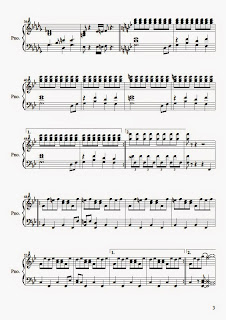Donnerstag, 8. Januar 2015
장기하와 얼굴들 - 그렇고 그런 사이
다시 한 번 말하겠지마는: I was first introduced to this song on an afternoon in Wonju during the early rainy season of 2010 by my then-girlfriend who called it an example of Korean indie rock. She outlined the lyrics’ content and pointed out that the “hand dance” in the video was amazing since the movements represented exactly what was happening in the lyrics. The consensus among most Koreans seems to be that Chang Kiha’s song writing is remarkable for its use of the Korean language. When I recognized the song coming out of a store in Seoul a few weeks later, the Korean friend I was with commented that Chang Kiha in his songs “spoke like a book”. Two years later when I discussed the band with my Korean tutor in England on the occasion of the band’s visit to London, he too called Chang Kiha a genius, pointing out that whereas most K-pop bands used Korean in a way that rather unnaturally made it sound like English, Chang Kiha had succeeded in adapting the idiosyncrasies of the Korean language to rock/pop music which seems to be something that even Koreans who are not particularly fond of the band give them credit for. I am not familiar enough with prior Korean rock or K-pop, or well-versed enough in the Korean language to assess the novelty of Chang Kiha’s writing. What I can tell is that his lyrics are extremely close to spoken-style Korean as opposed to written Korean, and frequently feature a vocabulary that tends towards the colloquial; for a number of the words I looked up, I realized I knew alternative Korean words which were the ones that are taught in language class. This is not to say that the vocabulary is eclectic or contrived, but just that Korean language frequently has a number of words meaning the same thing, and that Chang Kiha uses words which may be seen as not being the standard vocabulary, much like you would in a casual conversation. Some examples are ŏjŏkke, manyang and ttan te. This as well as the number of idioms used in the chorus and other places endows the song with a very Korean flavour that is almost impossible to capture in translation.
What I can comment more on is the music. All in all it can be best described with the words of a Chinese classmate upon seeing the lunch menu in the university cafeteria a couple of days ago (the lunch was a Korean take on Western food, including yoghurt, corn soup, bread with butter and jam, French fries and spaghetti, for those times when you need an extra generous helping of carbs): shingihan chohap (a wondrous combination). This song is a most shingihan chohap indeed: You have the somewhat cheesy, hurdy-gurdyish main keyboard figure with its folksy bass accompaniment, the main charm arising from the displacement of the three-beat figure in the keyboard against the four-beat meter across the space of two bars each. Then you have the abrupt breaks, the verse with its funky bass and the strange pick scrape sounds on the guitar, the unexpected shift from b flat minor to g minor (relative key to the parallel key b flat major) for the threatening and dramatic chromatics in the pre-chorus (James Bond theme says hi), and finally the return to cheesyness with the call and response in the chorus and the awkwardness of the spoken lyrics between the repetitions, growing ever more chaotic and increasing in rhythmic complexity as bass and drums add accents of their own. But maybe the shinghan chohap is the postmodern songwriter’s device of choice as he creates something like a musical collage and makes use of everything that is available to him. If we measure the quality of music with the question of how well it achieves to be what it is trying to be, this is certainly a very accomplished song in bringing something unlikely and refreshing to the table of the South Korean musical scene. Chang Kiha’s biggest achievement may then be in what he is trying to achieve – after listening to more of their music and also interviews with him, I believe he has a very authentic and interesting musical vision and the necessary confidence that sets him apart from those who are insecure in what they should be trying to be and end up being no more than derivative and generic.
This is probably the most difficult song arrangement I have made, mostly because of the verse and my determination to adapt the pick scrapes into a descending chromatic figure – since there is not much else going on in the instruments during the verses, omitting the pick scrapes is unfortunately not an option and I could not think of an easier way to adapt them to piano either. Despite creating some additional exercises and practising those parts Hanon-style for months, it has been a challenge to get a halfway decent take without major mistakes throughout the whole of the song (I don’t edit my videos). I am even more self-conscious knowing that whenever Koreans do anything in front of an audience, they will usually have perfected it. Yet there was a point when I felt I had to get this one out and move on to something else. Goes to show that all Europeans can do is copy Asians.
Abonnieren
Kommentare zum Post (Atom)







Keine Kommentare:
Kommentar veröffentlichen